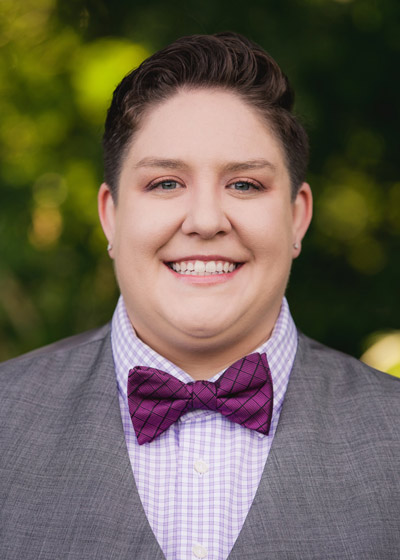Bust myths, master pronouns and be the ally our transgender colleagues need
Read Time: 4 minutes
July 05, 2021
 Theo Ray-Huntington has come out twice at work — once when they first started working for Cargill, and again more recently when they came out as transmasculine nonbinary (typically someone who was assigned female at birth but identifies and presents as masculine).
Theo Ray-Huntington has come out twice at work — once when they first started working for Cargill, and again more recently when they came out as transmasculine nonbinary (typically someone who was assigned female at birth but identifies and presents as masculine).
That can be an intimidating step. “As trans people, we get a lot of fear around rejection,” says Theo, continuous improvement lead for Cargill’s salt mines in Cleveland. “We hear about people who don’t have great experiences.”
At Cargill, Theo wasn’t among them. They sat down with each of their teammates to come out. Some had never worked with or known a person who was openly trans. Each teammate said, in their own way, “tell me what you need from me.”
“They were really respectful, from using they-them pronouns to changing my name,” Theo says. “I can honestly say that I have not been deadnamed at work”— that’s referring to a person who is transgender or nonbinary by their former name, which can be deeply hurtful and dismissive of their identity.
When Theo had to sign legal paperwork to use equipment in the mine, Cargill HR told them to use their preferred name without issue, sending a clear message: “We won’t let you face discrimination at work.”
Fulfilling that promise can be easier said than done. People who are transgender can face a number of obstacles to bringing their whole selves to work — from pronouns to stereotypes to real fears about safety.
We connected with three colleagues who are transgender to talk through some of the biggest barriers and misconceptions they face, and how all of us can be allies in creating a safe, welcoming workplace for everyone.
 You can be trans and like your body
You can be trans and like your body
Being transgender means having a different gender identity than the sex a person was assigned at birth. That doesn’t necessarily mean the person needs or wants to change their body, though.
“I think one of the greatest myths is that all trans people are dysphoric with their own bodies,” says Miguel Hideki Hatida, a corporate security analyst in Brazil.
He’s referring to discomfort and distress that can arise from a person having a gender identity that doesn’t match assigned sex. Some trans people seek hormone therapy or gender confirmation surgery.
“But it’s not mandatory, and it’s not everyone,” Miguel says. “There is this myth that you should do some kind of surgery. There are a lot of trans guys and trans ladies that are OK with their own bodies.”
Gender identity isn’t the same as sexual orientation
A person’s gender identity isn’t tied to their sexual orientation. “People assume if you’re a trans guy, you are heterosexual and you have to date women, for example,” Miguel says.
That’s not how it works. “People don’t realize they really are two different things,” says Theo. Just like cisgender people — that’s people whose gender identity matches their birth sex — people who are trans can be interested in all kinds of relationships.
 Myths about sexual orientation can be tied to broader misconceptions about what people who are transgender can do.
Myths about sexual orientation can be tied to broader misconceptions about what people who are transgender can do.
“People think we don’t have the ability to get married and have healthy relationships,” says Alessandra Goncalves Pacheco, a trade execution assistant who also works in Brazil. “They think, you cannot do this, you cannot be yourself, but that’s not true. We are capable of having families.”
There are heavy burdens to bear
Like Theo, both Alessandra and Miguel said Cargill has been a safe and welcoming place where they can be themselves. But in many places, the trans community faces dire challenges.
In Brazil, the average life expectancy is about 75 years old; for people who are trans, says Alessandra, it’s half that. More trans people were murdered in the country last year than anywhere else in the world.
Trans women in particular are often marginalized and pushed into dangerous situations like prostitution. “There’s this feeling that nothing’s really going to happen if you hurt or kill a trans woman,” Miguel says.
Alessandra says there’s an empathy gap when it comes to the trans community. “We need to change how people think,” she says. “We need empathy and we need respect.”
And our trans colleagues can’t bear them alone
“I wish more people understood the emotional burden of being trans and having to be your own advocate,” Theo says. “There’s fear of repercussions that could happen just for being myself, and that is a very large burden to carry.”
Words matter. Not respecting a person’s preferred pronouns, using the wrong name or making an anti-trans joke “might mean nothing to a cisgender person, but it’s terrible for us,” says Miguel.
Education matters, too — and colleagues who are transgender can’t be our only resource. When Miguel and Alessandra were hired through a program specifically designed to welcome trans employees into Cargill, their colleagues got education and training about the trans community covering everything from pronouns to names to sensitive questions.
“It’s so important that our colleagues get these conversations to let people know who we are,” Alessandra says.
There are practical changes that could help — normalizing the use of pronouns in introductions and email signatures, for example, or making sure a hiring manager knows a person’s preferred pronouns before an interview “so I don’t have that awkward, difficult conversation with them out of the gate,” Theo says.
And just as it does in racial equity and gender parity, representation matters. “It’s really hard to see a path for yourself if you don’t see yourself reflected in leadership,” says Miguel. “It’s so important to have a future where we see trans people in the leadership of big companies and give young people a chance to think, wow, that’s possible for me.”
